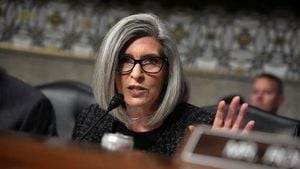Coca-Cola has initiated a massive recall affecting several of its beverages across Europe due to elevated chlorate levels, which have raised concerns over food safety compliance. On Monday, January 27, 2025, the company announced the recall for popular drinks including Fanta, Sprite, Fuze Tea, Minute Maid, Nalu, Royal Bliss, and Tropico, all distributed across multiple countries including Belgium, the Netherlands, Great Britain, Germany, France, and Luxembourg since November 2024.
The recall centers on products marked with specific production codes, ranging from 328 GE to 338 GE, which are believed to contain chlorate levels exceeding acceptable limits. This alarming development has prompted Coca-Cola Europacific Partners Belgium to deem the situation serious, with efforts underway to retrieve affected items from store shelves.
“We don’t have precise figures, but it’s clear this involves considerable quantities,” stated Coca-Cola Europacific Partners Belgium. The company is currently collaborating with food safety authorities to mitigate the situation. Although many of the products are already off the shelves, the company continues its mission to retrieve everything still available to consumers.
The potential health risks associated with high chlorate levels have been highlighted by Coca-Cola, urging customers not to consume the recalled beverages. Instead, these products can be returned for refunds at the point of purchase. “Des contrôles ont permis d’identifier des niveaux élevés de chlorate,” Coca-Cola confirmed, emphasizing the necessity of this recall.
Chlorate is commonly associated with disinfection processes, particularly those using chlorine to purify drinking water. It can inadvertently make its way through the food production and processing chain, which is plausible according to findings from the European Food Safety Authority (Efsa). They indicated, “Le chlorate peut être présent dans la nourriture suite à l’utilisation d’eau chlorée pour la transformation des aliments.” While exposure to large amounts over time can potentially harm health, particularly for children, the authority assessed the immediate risk as incredibly low.
With the scope of the recall encompassing virtually all Coca-Cola brands except for those packaged in PET plastic bottles, the specific production codes affecting various flavors include popular choices such as Coca-Cola, Sprite lemon-lime flavors, and various Fanta options like orange and exotic. The company has explicitly noted, "les bouteilles en plastique PET, les fontaines à boissons ou les tétra packs ne sont pas concernés” - indicating customers who consume those types of drinks are safe.
The range of beverages affected includes not just the original flavors but also sugar-free variants such as Coca-Cola Zero Sugar and special offerings like Minute Maid’s multivitamins. What's more, both glass bottles and various can sizes are implicated.
This expansive recall echoes both the commitment of Coca-Cola to consumer safety and the necessity for companies to uphold stringent safety standards. The quick response to addressing the chlorate concentrations showcases proactive measures taken against any potential hazards, even when such risk is assessed as low. Coca-Cola noted they are performing rigorous tests at their production facility located in Ghent where the contamination issue occurred.
The incident has sparked discussions around food safety regulations and the vigilance required when it concerns public health. Coca-Cola, acknowledging the gravity of the situation, provided apologies to consumers, retail partners, and health authorities for any distractions it may have caused.
Although extensive steps are being implemented to rectify the issue rapidly, consumers have been advised to verify the production code on their drinks, easily found at the bottom of cans or on the label of glass bottles. With the increased focus on the quality and safety of consumables, this cautionary measure by Coca-Cola serves as yet another reminder of the imperative regulatory frameworks guiding food and beverage production.
This recall reinforces Coca-Cola’s commitment to transparency and consumer safety, something fundamental to maintaining trust. Returning the affected products not only minimizes any potential health risks but also ensures equitable handling of this pervasive issue among consumers.
Moving forward, Coca-Cola intends to engage openly with the public to provide updates and resolutions built from the lessons learned through this recall process. Public interest and customer confidence will remain at the forefront, as they aim to restore normalcy following this incident.



